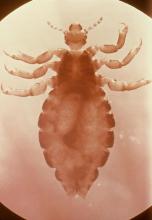User login
The Food and Drug Administration has approved a new topical treatment for head lice in children and adults.
Natroba Topical Suspension (spinosad 0.9%), proved more effective than Nix (permethrin 1%) when compared directly in clinical trials. In two trials involving a total of 1,038 children and adults, after one or two applications of spinosad, 85% and 87% of patients were lice free, compared with 45% and 43% of patients receiving permethrin (Pediatrics 2009;124:e389-95).
Another advantage of spinosad, according to its labeling, is that it doesn’t require combing to be effective. A single, 10-minute application of spinosad is followed by a warm-water rinse. If desired, a fine tooth comb can be used to remove dead lice and nits from the hair. A second application is permissible if the patient continues to harbor live lice 7 days later.
Investigators noted no serious adverse events in the trials, and only a small number of mild to moderate adverse events. The most common were application site erythema (seen in 6.8% of the patients given spinosad), ocular hyperemia (in 3.3% of patients), and application site irritation (in 1.5% of patients).
Spinosad works by causing neuronal excitation in insects. After a period of hyperexcitation, lice become paralyzed and die.
The FDA approval covered the use of spinosad in adults and children aged 4 years and older. The agency said that it is important not to use spinosad in infants younger than age 6 months. The product contains benzyl alcohol, which can cause serious reactions and even death in infants.
The clinical trials reported in Pediatrics were sponsored by ParaPRO, the manufacturer of Natroba. Two of the coauthors received research funding from ParaPRO, and two others served as consultants to the company.
The Food and Drug Administration has approved a new topical treatment for head lice in children and adults.
Natroba Topical Suspension (spinosad 0.9%), proved more effective than Nix (permethrin 1%) when compared directly in clinical trials. In two trials involving a total of 1,038 children and adults, after one or two applications of spinosad, 85% and 87% of patients were lice free, compared with 45% and 43% of patients receiving permethrin (Pediatrics 2009;124:e389-95).
Another advantage of spinosad, according to its labeling, is that it doesn’t require combing to be effective. A single, 10-minute application of spinosad is followed by a warm-water rinse. If desired, a fine tooth comb can be used to remove dead lice and nits from the hair. A second application is permissible if the patient continues to harbor live lice 7 days later.
Investigators noted no serious adverse events in the trials, and only a small number of mild to moderate adverse events. The most common were application site erythema (seen in 6.8% of the patients given spinosad), ocular hyperemia (in 3.3% of patients), and application site irritation (in 1.5% of patients).
Spinosad works by causing neuronal excitation in insects. After a period of hyperexcitation, lice become paralyzed and die.
The FDA approval covered the use of spinosad in adults and children aged 4 years and older. The agency said that it is important not to use spinosad in infants younger than age 6 months. The product contains benzyl alcohol, which can cause serious reactions and even death in infants.
The clinical trials reported in Pediatrics were sponsored by ParaPRO, the manufacturer of Natroba. Two of the coauthors received research funding from ParaPRO, and two others served as consultants to the company.
The Food and Drug Administration has approved a new topical treatment for head lice in children and adults.
Natroba Topical Suspension (spinosad 0.9%), proved more effective than Nix (permethrin 1%) when compared directly in clinical trials. In two trials involving a total of 1,038 children and adults, after one or two applications of spinosad, 85% and 87% of patients were lice free, compared with 45% and 43% of patients receiving permethrin (Pediatrics 2009;124:e389-95).
Another advantage of spinosad, according to its labeling, is that it doesn’t require combing to be effective. A single, 10-minute application of spinosad is followed by a warm-water rinse. If desired, a fine tooth comb can be used to remove dead lice and nits from the hair. A second application is permissible if the patient continues to harbor live lice 7 days later.
Investigators noted no serious adverse events in the trials, and only a small number of mild to moderate adverse events. The most common were application site erythema (seen in 6.8% of the patients given spinosad), ocular hyperemia (in 3.3% of patients), and application site irritation (in 1.5% of patients).
Spinosad works by causing neuronal excitation in insects. After a period of hyperexcitation, lice become paralyzed and die.
The FDA approval covered the use of spinosad in adults and children aged 4 years and older. The agency said that it is important not to use spinosad in infants younger than age 6 months. The product contains benzyl alcohol, which can cause serious reactions and even death in infants.
The clinical trials reported in Pediatrics were sponsored by ParaPRO, the manufacturer of Natroba. Two of the coauthors received research funding from ParaPRO, and two others served as consultants to the company.
FROM THE FOOD AND DRUG ADMINISTRATION
